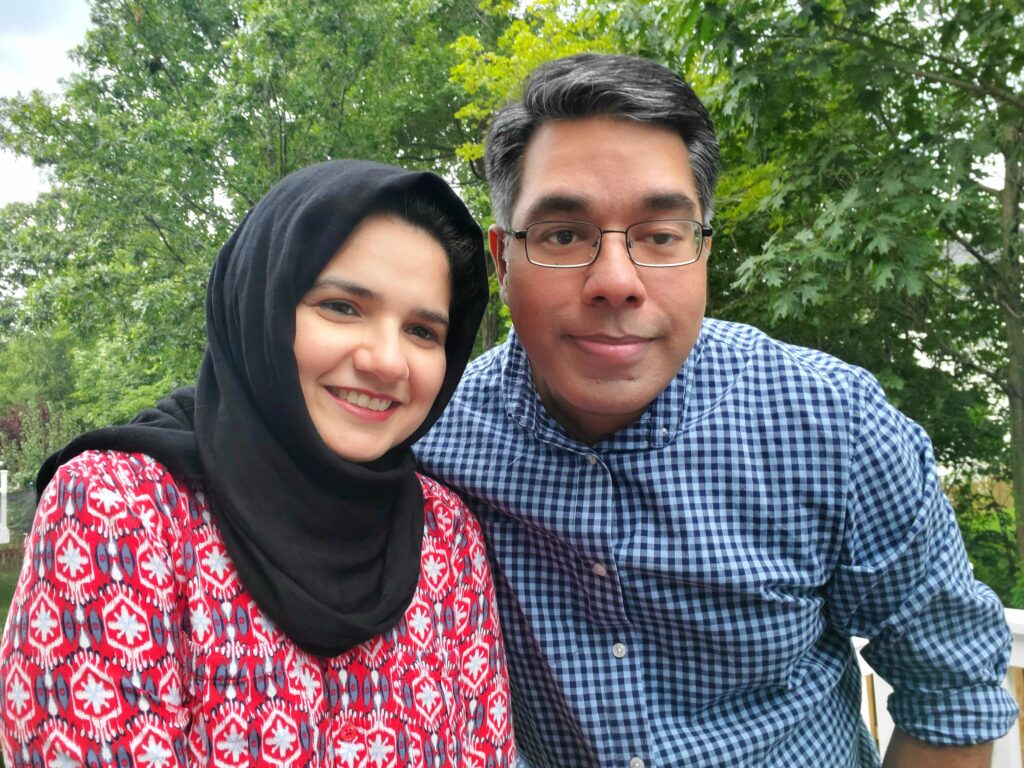A personnal care incident leads to an experience, joy and fulfillment

By Rabiyah Syed
March/April 2022
Last October, an American Muslim small business excitedly announced, “We landed in Italy!”
The celebrant was Mango Creek (www.mangocreek.net), a Northern Virginia home business founded and run by Mohammad H. Burney and his wife, Hina Jawed, who make all-natural and organic body and self-care products and candles.
Along with Mango Creek, Burney, a software engineer by day, is also the founder of Seemi’s Confections — a halal, handmade gourmet chocolate boutique.
As the pandemic continues to drive e-commerce retail to new levels, Burney has carved his niche online by handcrafting all-natural, preservative-free products made with ethically sourced and certified organic ingredients. The driving force behind every Mango Creek product is to lessen customers’ dependency on harsh chemical-laden products that have known long-term harmful effects.
Mango Creek’s story started with an unfortunate allergic reaction to an organic body product. After consulting with a doctor, the couple discovered that although a product may be labeled organic or natural, it can still contain harmful ingredients. Their ensuing research led them to start making their own soaps and candles. Slowly replacing their off-the-shelf personal products with their own creations, they shared the excess with friends and family.
Burney says that “there was initially no intention to start a business. But as we continued to receive positive feedback, we slowly started adding more variety in our soaps, and candles and finally decided to launch in January 2018.”
When they first started, Mango Creek only made candles and soaps. Over time, however, they have expanded into creating whipped body butters, lotion bars, bath bombs and a full range of men’s grooming products. They continue to add new products to their existing 30+ distinct items.
With the growing success of Mango Creek, Burney decided to pursue his long-term interest in and passion for the culinary arts. The result — Seemi’s Confections www.seemisconfections.com) — began during Ramadan 2018 and fills a need for halal gourmet chocolates. Their Eid chocolate boxes turned out to be a resounding success, with shipments to over 28 states. Now in its fourth year, Seemi’s continues to provide a varied selection of gourmet treats catering for all occasions.
Raising the Bar on Product Quality
Making quality products can be time consuming. Burney explains that each product went through a long trial-and-error period before it attained the desired quality. Although the process is now quicker, due to the perfected recipes, the manufacturing process still takes time because many of the products require multiple steps. For example, while making soap only takes two hours per batch, it needs approximately one month to cure. Candles, hand-poured a dozen at a time, require two weeks to cure. The creation of these products is truly a family operation.
While Burney and his wife are responsible for making the products, their sons, aged 13, 10 and 6, contribute by helping with packaging, shipping and inventory management – and also double as taste testers for the chocolates! As Hani ibn Niyar reported, “Prophet Muhammad (salla Allahu ‘alayhi wa sallam) said that the best type of working and earning is [that] for which a man works with his hands and does honest trading” (“Ibn Hanbal” and “Musnad Ahmad” 15523).
Burney takes great pride in telling us, “We use only the best ingredients when creating our products — whether for Mango Creek or Seemi’s Confections.” They source their products from other small U.S. businesses that procure certified organic raw materials worldwide. Additionally, many of the ingredients are also Fairtrade.
Fairtrade guarantees fair wages and treatment of workers and ensures ethically sourced and produced products. A FAIRTRADE mark signifies that the product has met stringent international standards. The fair-trade system is also aligned with the Quran’s command: “And to the people of Midian We sent their brother Shu’aib. He said, “O my people! Worship God — you have no other god except Him. A clear proof has already come to you from your Lord. So, give just measure and weight, do not defraud people of their property, nor spread corruption in the land after it has been set in order. This is for your own good if you are [truly] believers” (7:85).
As a growing business, like many small businesses Mango Creek faces various challenges. Burney admits, “Getting the word out continues to be the biggest hurdle.” Despite having a social media presence and website for both brands, he states, attracting potential clients in a crowded market takes a lot of effort. In addition to their online presence, they can also be found at various farmers markets, as well as at craft and holiday markets in the Northern Virginia area.
Their efforts recently resulted in a major milestone: acquiring an international presence. A boutique in Italy has become the first overseas retailer to carry a variety of Mango Creek products. Burney and his team hope to continue expanding abroad, “Canada is something we are quite interested in, with its proximity and ease of transporting goods, although we are open to all overseas markets.”
Why Muslims Should Support Small Businesses
Mango Creek is classified as a small business, an economic sector considered the heart of the American economy. According to the U.S. Office of Advocacy, 44% percent of the country’s economy is fueled by small businesses and, as of 2020, they employ 47% of all American workers. As Muslims, we need to diversify our buying across the many amazing small businesses in our community. The pandemic, which continues to adversely affect everyone, has hit small businesses especially hard. Supporting them not only provides growth opportunities, but also enables our communities to thrive.
Rabiyah Syed, a student at Naperville Central, loves photography and aspires to be a speech pathologist.